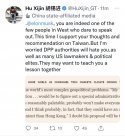U.S. intensifies assault on China chip ambitions
Strictest ever curbs on exports of advanced tools, AI chips and more
The U.S. has introduced sweeping export controls aimed at curbing almost every aspect of China's semiconductor development as part of its toughest crackdown yet on Beijing's tech ambitions.
The U.S. Commerce Department on Friday barred American companies from shipping certain grades of advanced chip equipment to any Chinese client without a license, effective immediately. The same curbs will apply to shipments of American-made electronics parts or other items that China could use to produce its own chipmaking tools and equipment.
Under the new rules "U.S. persons" will also be restricted from providing support to the development or production of chips at Chinese "semiconductor fabrication facilities without a license," starting Oct. 12.
The commerce department also tightened the so-called Foreign Direct Product Rule to restrict China's ability to obtain or build cutting-edge chips used in supercomputers and artificial intelligence applications. These curbs will also apply to global chipmakers, including Samsung of South Korea and Taiwan Semiconductor Manufacturing Co., whose manufacturing relies on American technologies.
The new rules show Washington's determination to restrict China's ability to develop cutting-edge semiconductors and computer systems that are crucial for Beijing's advanced manufacturing as well as many security, space, and defense applications.
"The PRC government is attempting to divert a lot of civilian technologies, particularly in computing, space, AI and communications, into areas of supercomputers in civil-military fusion programs as well as other areas such as surveillance that link with human rights abuses," a senior U.S. Commerce Department official said when outlining some of the reasons for the tighter rules.
They come as the U.S. is attempting to shore up its domestic semiconductor industry, including by offering generous federal and state subsidies for chipmakers.
The restrictions on chip equipment could hit Chinese memory chip champions Yangtze Memory Technologies (YMTC) and ChangXin Memory Technologies particularly hard, as both companies are in the midst of ramping up their output.
They will also create hurdles for Chinese chipmaking equipment makers such as Naura and Advanced Micro-Fabrication Equipment, which are working to help Chinese chipmakers get around U.S. sanctions by building up domestic production tools to
.
YMTC was one of more than 30 companies and research institutions that the U.S. on Friday placed on an "Unverified List" of clients. The list is intended as a red flag to American suppliers to be careful of doing business with those named. If these companies fail to provide documentation required by the U.S., they are likely to be officially blacklisted on Washington's so-called Entity List, alongside the likes of Huawei Technologies.
The U.S. further said on Friday that 28 entities already blacklisted will be subject to enhanced export controls under the Foreign Direct Product Rule, to restrict their ability to source from foreign suppliers using any American technologies.
Under the new rules, a license is required to ship chip equipment that can make processors and other logic chips using 14/16-nanometer technology or better. In logic chipmaking, a smaller nanometer number generally indicates a more advanced chip. The latest iPhone processors are produced with 5-nm chip tech.
For DRAM chips, the restrictions kick in for tools that are 18-nm or better, while for NAND flash memories the rules apply to machines capable of making chips with 128 or more layers.
NAND and DRAM are key types of memory components needed for all electronic devices, from smartphones and computers to servers and connected cars.
YMTC mass-produces 3D NAND flash memory chips on the 128-layer level, about one or two generations behind global leaders, and aims to put the next generation of 192-layer chips into production within a year.
American chip equipment makers such as Applied Materials, Lam Research and KLA are still sorely needed if China is to quickly and smoothly ramp up chip production.
According to a Boston Consulting Group analysis, there are at least 23 types of chipmaking equipment for which American companies control more than 65% of global supply.
The new rules on advanced chipmaking tools apply only to U.S. companies and not foreign players such as ASML and Tokyo Electron. However the U.S. is working closely with "like-minded" allies to persuade them to similarly restrict exports of technology that China could use to build advanced chips used in weapons, supercomputers and surveillance applications that violate human rights, according to a senior Commerce Department official.
"We've briefed and consulted with close allies and partners on these controls, in the new obligations that they create related to chips designed with U.S. tools, software or equipment or tooling experts involving U.S. persons," the official said. "We expect all countries to comply with these measures as we do with all of our export controls."
Mark Li, a veteran semiconductor analyst with Sanford C. Bernstein, sees the American move as set to substantially slow China's chip development.
"If the ban also widens to bar U.S. citizens or people to provide support to Chinese companies, that could have a big effect too," Li said. "After all, talents and their know-hows are great assets to develop next generation chip technologies."
Source:
Non-paywall source:

